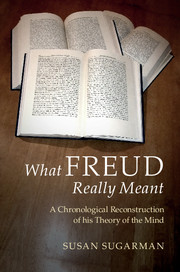Book contents
- Frontmatter
- Dedication
- Contents
- Acknowledgments
- Introduction
- 1 Freud on psychoanalysis: Five Lectures on Psychoanalysis (1909a)
- 2 The pleasure and reality principles: “Formulations regarding two principles in mental functioning” (1911); “The psychology of the dream-processes” from The Interpretation of Dreams” (1900)
- 3 Ambivalence and the origin of the civilized mind: “Taboo and emotional ambivalence” from Totem and Taboo (1913b)
- 4 Narcissism as a stage in development: “On narcissism: an introduction” (1914)
- 5 The impetus to the mind: “Instincts and their vicissitudes” (1915a)
- 6 The possibility of repression: “Repression” (1915b); “Negation” (1925a)
- 7 The unconscious and the structure of the mind: “The unconscious” (1915c)
- 8 Beyond the pleasure principle: Beyond the Pleasure Principle (1920)
- 9 A new architecture of the mind: The Ego and the Id (1923)
- 10 Pleasure revised: “An economic problem in masochism” (1924)
- 11 Civilization, morality, and the pursuit of pleasure: Civilization and its Discontents (1930)
- Epilogue: What Freud really meant
- References
- Index
5 - The impetus to the mind: “Instincts and their vicissitudes” (1915a)
Published online by Cambridge University Press: 05 April 2016
- Frontmatter
- Dedication
- Contents
- Acknowledgments
- Introduction
- 1 Freud on psychoanalysis: Five Lectures on Psychoanalysis (1909a)
- 2 The pleasure and reality principles: “Formulations regarding two principles in mental functioning” (1911); “The psychology of the dream-processes” from The Interpretation of Dreams” (1900)
- 3 Ambivalence and the origin of the civilized mind: “Taboo and emotional ambivalence” from Totem and Taboo (1913b)
- 4 Narcissism as a stage in development: “On narcissism: an introduction” (1914)
- 5 The impetus to the mind: “Instincts and their vicissitudes” (1915a)
- 6 The possibility of repression: “Repression” (1915b); “Negation” (1925a)
- 7 The unconscious and the structure of the mind: “The unconscious” (1915c)
- 8 Beyond the pleasure principle: Beyond the Pleasure Principle (1920)
- 9 A new architecture of the mind: The Ego and the Id (1923)
- 10 Pleasure revised: “An economic problem in masochism” (1924)
- 11 Civilization, morality, and the pursuit of pleasure: Civilization and its Discontents (1930)
- Epilogue: What Freud really meant
- References
- Index
Summary
Instincts and not external stimuli are the true motive forces behind the advances that have led the nervous system, with its unlimited capacities, to its present high level of development.
– S. Freud, “Instincts and their vicissitudes,” 1915a, p. 120This paper establishes the force that prods the psychical system to action, which is to say the occurrence that produces the tension due to need, such that the organism undertakes to dispel the tension. That force is the impingement of stimuli, which divide into excitations arriving from without, like a bright light striking the eye, on the one hand, and those, like hunger, on the other, arising from within. Freud calls the latter group instincts. Instinctual needs, so defined, provide an especially potent impetus to the system because of the complexities involved in satisfying them. Although we can flee an external stimulus, we cannot escape an internal one, such as the pain of hunger. We have to satisfy it.
The paper also contains Freud's first pass at categorizing the possible instincts that can arise. In this effort he strives to distinguish those instincts that are so basic they admit of no further analysis. He selects for the purpose the ego and sexual instincts, drawing from the prototype of hunger and love. The ego instincts address self-preservation, and the sexual instincts a range of interests extending from the production of pleasurable sensations on the body to our emotional connection with others. The two classes of instincts also express the distinction between individual and species continuity. The ego instincts preserve the individual, and the sexual instincts the species.
Freud next develops his theory of how instincts function based on the sexual ones, which he finds the easier of the two classes to observe. Accordingly, the final section of the paper addresses the continuity that exists across at least the part of our mental life occupied by the sexual instincts and their derivatives. In what Freud will label “vicissitudes,” these instincts can transform one into the other, for instance the instinct of sadism into masochism, scopophilia into exhibitionism, love into hate, and vice versa.
“Instincts and their vicissitudes” discusses only the two more straightforward of the four vicissitudes Freud mentions: reversal into the opposite, and turning around on the subject.
- Type
- Chapter
- Information
- What Freud Really MeantA Chronological Reconstruction of his Theory of the Mind, pp. 46 - 61Publisher: Cambridge University PressPrint publication year: 2016



